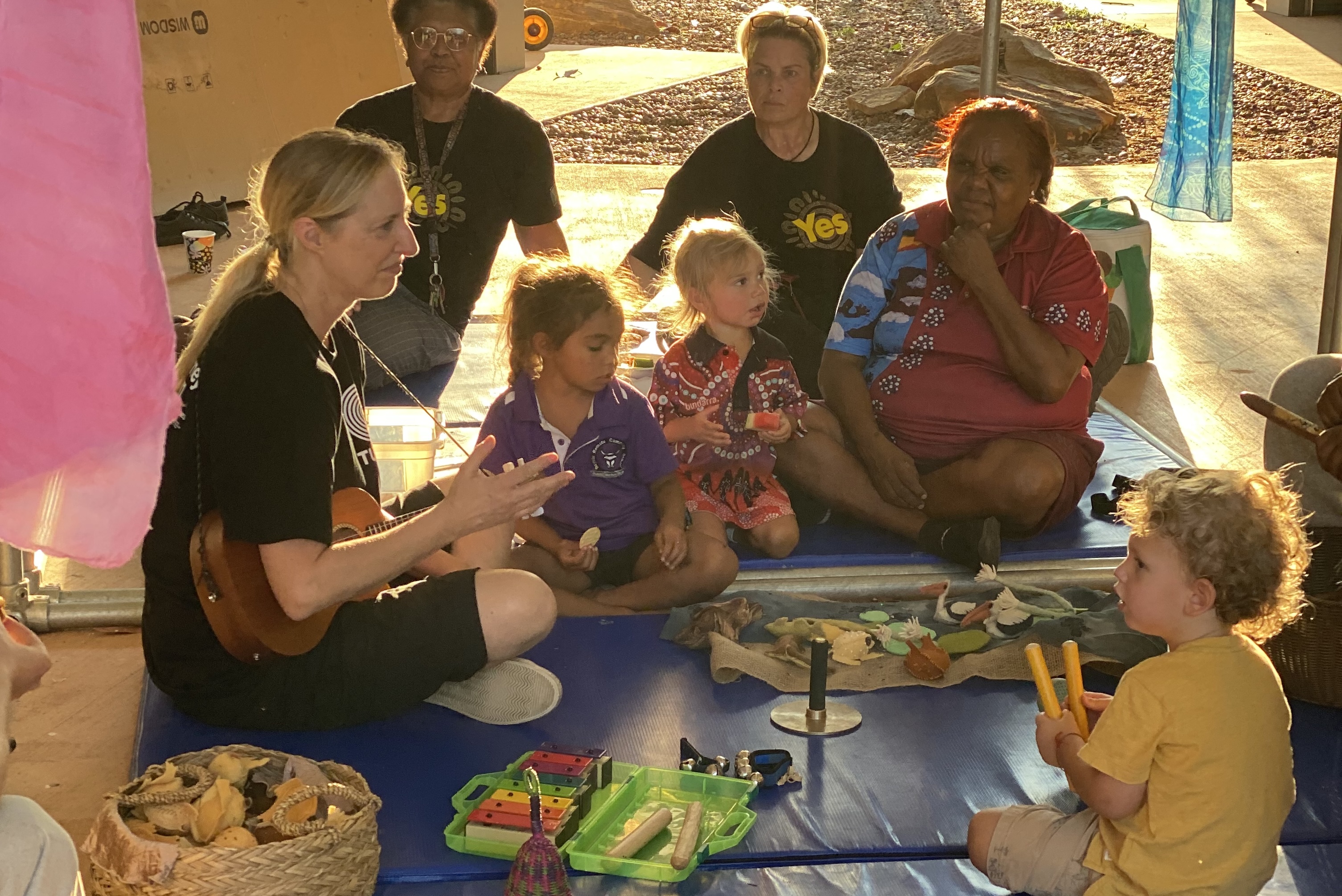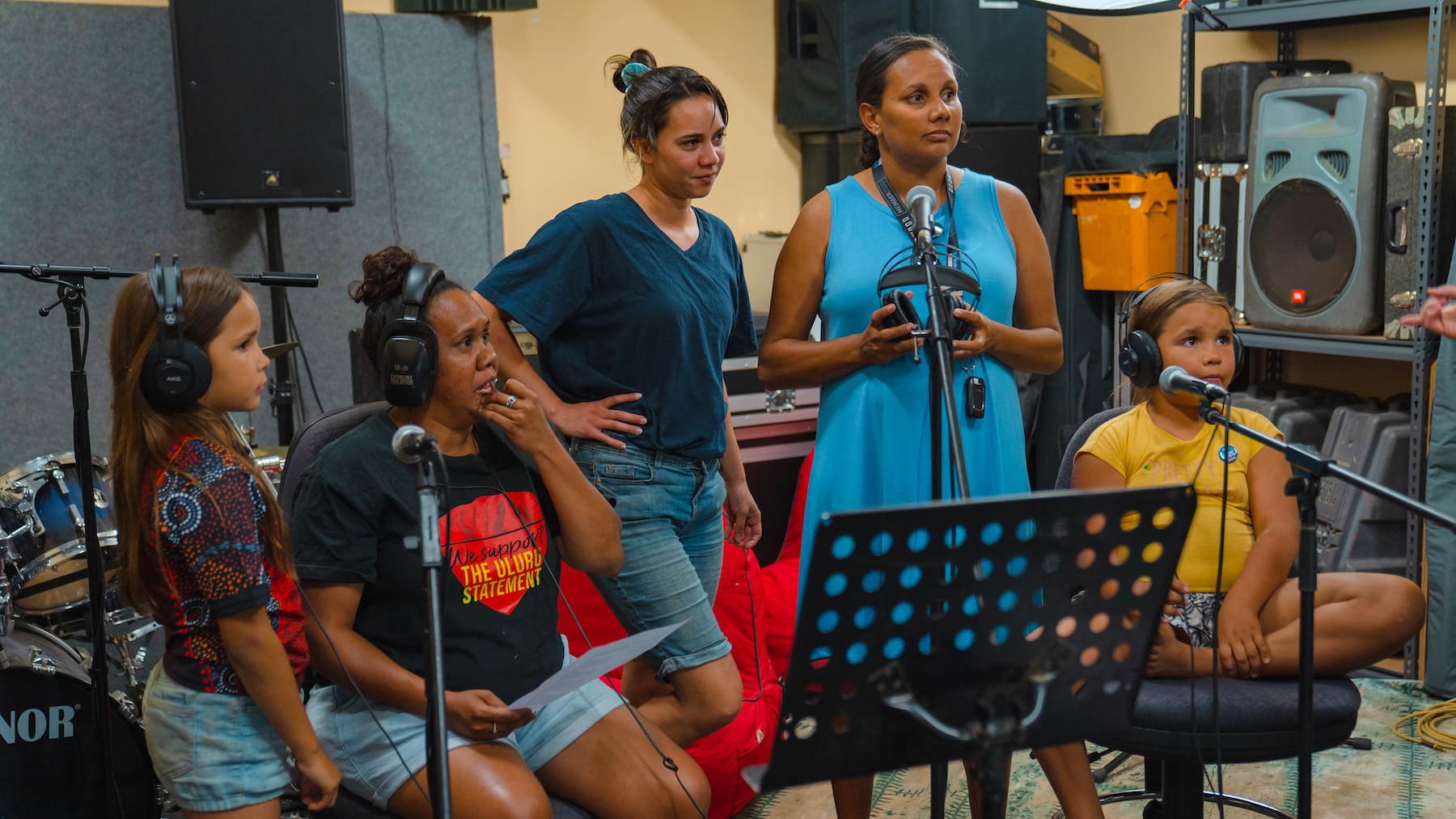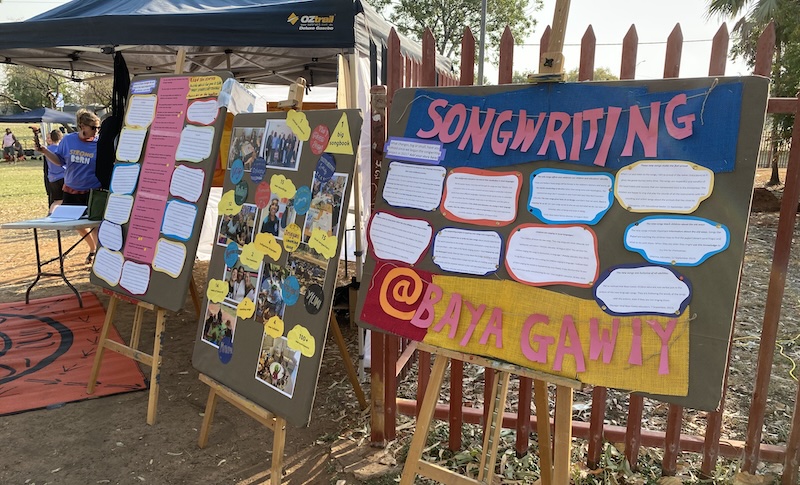We use cookies on this site to enhance your experience.
By selecting “Accept” and continuing to use this website, you consent to the use of cookies.

June 2025
Dr. Gillian Howell has been actively engaging with community music research and practice in spaces of post-conflict arts and cultural development, peacebuilding, and dialogue for many years. Presently a Senior Research Fellow at The University of Melbourne, and also a Research Fellow at the Laurier Centre for Music in the Community, she investigates how dialogic community arts praxis can support processes of community strengthening, cultural restoration, and conflict transformation in contexts shaped by violence, colonisation, and dispossession.
One of her projects, Sound FX, began in 2017 and is grounded in Gillian’s ongoing relationship and collaboration with a First Nations Aboriginal community in the far northwest of Australia, in an area called the Fitzroy Valley. Sound FX, which Gillian directs on behalf of Tura, an Australian cultural development organisation, explores music, story, cultural knowledge, and language through long term collaborations with education and community partners in the Fitzroy Valley. Sound FX aims to strengthen and diversify the ways that music-making can support community goals around language knowledge, wellbeing, and healing.

A key partner is the Marninwarntikura Women’s Resource Centre (Marnin) and its early childhood care and education service, Baya Gawiy Buga Yani Jandu Yani U. Gillian’s collaborative work with Marnin and Baya Gawiy began in 2017, but deepened when Marnin and its team of early childhood educators invited Gillian and Tura to help them create a collection of music resources (songs, instruments, and practices) that could increase the use of First Languages in their daily programs. In this region, like many others, earlier policies of assimilation and child removal have had a devastating impact on language and culture, disrupting the traditional patterns of knowledge transmission between older and younger generations. As the last generation of fluent speaking Elders ages, there is an urgent need to support their efforts to keep language strong among younger generations. Collaborative songwriting in First Languages to build a collection of original songs was seen as an ideal way to address this goal—a way to create new song resources while also supporting a younger generation of educators to build confidence in using their First Languages in their creative work, bring more of their knowledge into their workplace, and ensure culturally-grounded early childhood education and care for their little ones.
The songwriting project complemented the work the Baya Gawiy team had already been doing to support cultural strength and language restoration through book writing, illustrating, and publishing children’s books through a national not-for-profit publisher the Indigenous Literacy Foundation. Recognizing the value of additional ways of engaging children in the culture and language through song, the educators worked in groups or individually with Gillian to create songs to also tell the stories alongside these books. They recorded the new songs in family groups so that grandmothers are singing with their grandchildren or daughters.
All of this work has been documented and further analysed through an arts-based action research project, New Songs at Baya GawiyBaya Gawiy community members worked as co-songwriters, co-researchers, and co-analysts, using oral, visual, and creative methods to show how songwriting can support language revitalisation and nourish community wellbeing, and sharing their findings through displays, broadcasts, and social media. Between 2021 and 2024, the New Songs at Baya Gawiy project produced fifteen new songs in Bunuba, Gooniyandi, Walmajarri, and Kimberley Kriol.

Dissemination of findings in the form of research displays, short videos on social media, began in 2023. But the New Songs are set to have national impact in 2025 with the September 2025 release of a beautifully-illustrated songbook of 22 original songs co-written by Baya Gawiy educators with Gillian and Tura, and a free digital companion album. “The songbook will be distributed free by our publishers ILF across the Fitzroy Valley, but it will be available for sale nationwide, with all royalties going back to the community for investment in future language and arts programs. The artwork—all by local children and adults—is stunning, and the songs are catchy, playful, and already supporting the work of language educators in the local schools and education settings. The songbook publishing process was incredibly involved - we have over 50 contributors! - and certainly more complex than I anticipated when the idea was first proposed. But when something begins to grow in community, you have to follow its lead—that’s the heart and responsibility of community-led work, and the songbook is the natural result of that.”
It has also been important to document the experiences of the adults involved who have also been learners, immersing themselves in continued learning of their language and culture through this creative work. One of the educators, Patricia Cox observed how, ‘songwriting helps us use language in a more simple way. You don’t need to use so many words in a song. It makes us feel more creative, realising this.” As an adult language learner, putting her knowledge into songs to use in her teaching had additional significance. “Once you know your language so strong, that’s it. You can just write anything into a song. We feel like the song belongs to us. You feel that different vibe, you know? That feeling, like, you’re writing your own song in language - wow!”
Gillian continues to work with the Sound FX project alongside several other major creative, community music projects internationally.
To find out more:
Marninwarntikura Women's Resource Centre
New Songs at Baya Gawiy - research report
Samples of the Project:
2023 Research Update video
2024 - Meet the Songwriters: June Nixon
2024 - Meet the Songwriters: Patricia Cox